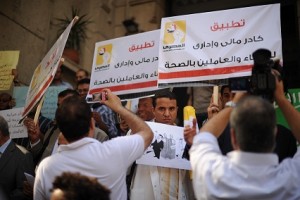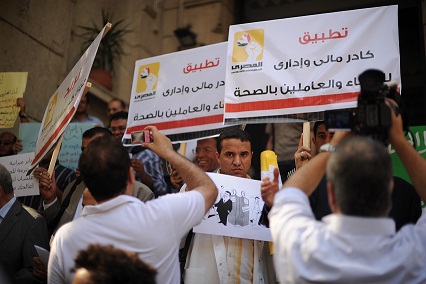By Luiz Sanchez and Hend Tarek

A crowd of twenty people gathered at the Suez General Hospital on Sunday to protest the ongoing partial doctor’s strike and the subsequent closure of the hospital pharmacy, which protesters claim has led to the deterioration of health conditions for many patients.
The crowd comprised of local residents receiving treatment at the hospital gathered in the reception area of the hospital and began shouting at employees about the lack of treatment.
“It is not my fault the doctors are on strike,” one patient said.
“I am an elderly person and suffer from fatigue and stress and my right to treatment has been denied for a second month in a row because of the failure to resolve the problem doctors have with the state.”
According to the hospital director, Ahmed Al-Amin, the patients were mostly upset because they had no access to the clinics. “They have a right to their demands,” he said.
“[The hospital] respected the doctors’ strike for two and a half months and now despite this, I must re-open the clinics.”
Al-Amin said the decision to reopen the clinics was largely based on security concerns, such as the breaking and entering of clinics to obtain medicine by people who would otherwise suffer without proper diagnosis and medication. With the clinics reopening he hoped at least half the doctors would return to work, adding the hospital was looking for doctors that would be willing to fulfil their duties.
Al-Amin said a few of those present, some of which he identified as 6 April members, were attempting to incite violence but failed to do so.
Doctors on strike or in support of the strike have told their patients to demand free treatment. Emteyaz Hasoona, one of the leaders of the strike was referred to investigations by the head of Ras Al-Tin Hospital after a doctor in the hospital, who she said belonged to the Muslim Brotherhood, made a complaint against her. “The complaint said that I was interfering in his work because I told one of his patients to demand free treatment.”
Offering patients free treatment is part of the doctors’ partial strike which started on 1 October. “It is also part of the treatments law of Egypt,” Hasoona said.
Many of the doctors who chose to support the strike have faced intransigence from hospital administrations. Hasoona said that this was the first time she has faced problems for supporting the strike but said that many doctors have faced hurdles, including Nadia Younis from Kafr Al-Dowar Hospital.
“The strike is continuing until the general assembly convenes next Friday where we will decide if the strike will be escalated, suspended based on certain conditions or continued,” she added.
Additional reporting by Hassan Ghonema

